
150 Results

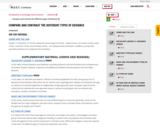
OER Text materialCrime and the LawChapter 7, subsection 7.3. At this subsection various types of crimes – violent crimes, non-violent crimes, street crimes, corporate crimes, and victimless crimes – are compared and contrasted. In addition, primary and secondary deviance are compared and contrasted.
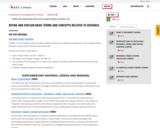
OER Text materialDeviance and ControlChapter 7. In this chapter, several concepts related to deviance are defined and explained. Such concepts include deviance, social control, sanctions, and social order.General Comments on this Section:Data on hate crime is too old – 2009/10Two typos in the chapter at pages 142 AND 144The concept of “Formal sanctions” is used in the chapter. It should be added that formal sanctions are the same as lawsA Table is needed for Merton’s Mode of Adaptation
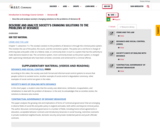
OER Text materialCrime and the LawChapter 7, subsection 7.3. The society’s solution to the problems of deviance is through the criminal justice system. This involves the use of the police, the courts, and the corrections system. The police are a civil force in charge of enforcing laws and public order at a federal, state, or community level. A court is a system that has the authority to make decisions based on law. The corrections system, more commonly known as the prison system, is charged with supervising individuals who have been arrested, convicted, and sentenced for a criminal offense.
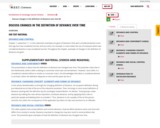
OER Text materialDeviance and ControlChapter 7, subsection 7.1. In this subsection examples are given of behaviors that were considered deviant some time ago but now considered normal, and vice versa. For example, in some states the use of marijuana which was considered deviants is now considered normal. Throughout the chapter, examples of changes in the definition of deviance are given.
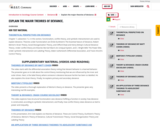
OER Text materialTheoretical Perspectives on DevianceChapter 7, subsection 7.2. In this section, functionalism, conflict theory, and symbolic interactionism are used to explain deviance. Theories under functionalism are Émile Durkheim’s The Essential Nature of Deviance, Robert Merton’s Strain Theory, Social Disorganization Theory, and Clifford Shaw and Henry McKay’s Cultural Deviance Theory. Under conflict theory are theories like Karl Marx’s An Unequal System, and C. Wright Mills’ The Power Elite. Under symbolic interactionism are Labeling Theory, Edwin Sutherland’s Differential Association, and Travis Hirschi’s Control Theory.

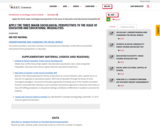
OER Text Material Understanding and Changing the Social WorldThis section provides a very basic overview of Functionalist (most detailed), Conflict (thin) and Symbolic Interactionist (thin) perspectives on education.
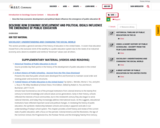
OER Text materialSociology: Understanding and Changing the Social WorldThis section provides a general overview of the history of education in the United States. It covers how education moved from a the exclusive remit of the wealthy to a public education system due to the needs of an industrial economy and a desire to establish and reinforce “American” values over all others.
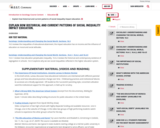
OER Text materialSociology: Understanding and Changing the Social World, Sections: 16.316.3 reviews the inequalities of educational attainment, the impact education has on income and the influence of education on moral and social attitudes. Sociology: Understanding and Changing the Social World, Sections:, 16.4.1, 16.4.2, and 16.4.516.4.1 reviews how education perpetuates inequality. 16.4.2 reviews the historical and contemporary existence of segregation in schools. 16.4.5 explores why we see social inequalities reflected in the higher education system.
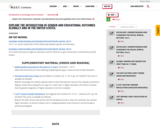
OER Text materialSociology: Understanding and Changing the Social World, Section: 16.3.116.3.1 U.S.-centric exploration of the relationship between gender and education.Sociology: Understanding and Changing the Social World, Section: 16.4.316.4.3 Brief summary of single sex education and the influence on girls ‘and women’s achievement and self-esteem.
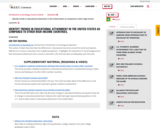
OER Text MaterialIntroduction to Sociology 2e, Derived from Introduction to Sociology by OpenStaxThis section of Open Stax describes the differences in educational resources around the world and explores differences in access to education from a global perspective. It highlights the importance of social background in both educational attainment and in access to education. (The main text does not adequately cover this area.)

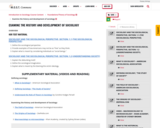
OER Text Material Sociology and the Sociological Perspective, Section: 1.1 (The Sociological Perspective)Define the sociological perspective.Provide examples of how Americans may not be as “free” as they think.Explain what is meant by considering individuals as “social beings.”Sociology and the Sociological Perspective, Section: 1.2 (Understanding Society)Explain the debunking motif.Define the sociological imagination.Explain what is meant by the blaming-the-victim ideology.
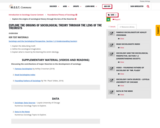
OER Text MaterialsSociology and the Sociological Perspective, Section 1.2 (Understanding Society)Explain the debunking motif.Define the sociological imagination.Explain what is meant by the blaming-the-victim ideology.
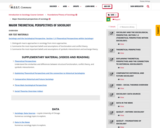
OER Text MaterialsSociology and the Sociological Perspective, Section 1.3 (Theoretical Perspectives within Sociology)Distinguish macro approaches in sociology from micro approaches.Summarize the most important beliefs and assumptions of functionalism and conflict theory.Summarize the most important beliefs and assumptions of symbolic interactionism and exchange theory.

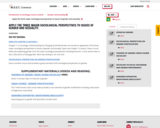
OER Text materialOpen Stx Chapter 12 section 2Chapter 11 in Sociology: Understanding the Changing Social World does not include an application of the three major sociological perspectives to issues of gender and sexuality. Open stax Chapter 12 section 2 does a much better job explaining gender from the major sociological perspectives including feminism. In this section there is also a discussion of doing gender, which was lacking in our core text.Sociological Perspectives on Gender StratificationHere is another source that provides a good overview of the sociological perspectives on gender.
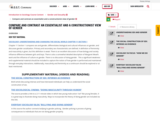
OER Text materialSociology: Understanding and Changing the Social World Chapter 11 Section 1Chapter 11 Section 1 compares sex and gender, differentiates biological and cultural influences on gender, and discusses gender socialization. Primary and secondary sex characteristics are defined. A definition of femininity and masculinity is given, but this definition is weak. There is an excellent discussion of how biology and society influence difference between girls and boys. There is also a somewhat detailed description of Margaret Mead’s work and the influence of culture on gender. There is no discussion of doing gender. This a significant weakness and supplemental material should be included to capture the notion of how gender is performed and maintained through everyday interactions. Additionally, masculinity and femininity as a continuum should be explored or at least mentioned.
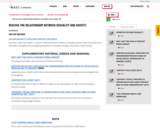
OER Text materialSex and Sexuality: Open Stax Chapter 12 Section 3Summary: Open Stax chapter 12 section 3 defines key terms related to sexuality, examines view of sexuality cross-nationally, and applies the sociological perspectives to sexuality including a discussion of queer theory.